
Airbus intends to carry out ground and flight testing of the inchoate hydrogen fuel-cell architecture aboard its ZEROe demonstrator aircraft—an A380 currently being retrofitted with an aft, port-side, fuselage-mounted, gas-turbine engine modified to run on Hydrogen fuel. The A380 being converted to the ZEROe demonstrator is, in fact, MSN1— the first-ever A380 to roll off the production line. In addition to the hydrogen engine and its pylon, MSN1 will be fitted with liquid hydrogen tanks and the distribution systems peculiar to such.
Airbus vice president of zero-emission aircraft Glenn Llewellyn states: “Fuel cells are a potential solution to help us achieve our zero-emission ambition and we are focused on developing and testing this technology to understand if it is feasible and viable for a 2035 entry-into-service of a zero-emission aircraft. At scale, and if the technology targets were achieved, fuel-cell engines may be able to power a one-hundred-passenger aircraft with a range of approximately one thousand nautical miles.
By continuing to invest in this technology we are giving ourselves additional options that will inform our decisions on the architecture of our future ZEROe aircraft, the development of which we intend to launch in the 2027-2028 timeframe.” Because it emits no carbon dioxide when generated from renewable energy and yields primarily water as a by-product of “combustion,” Airbus deems hydrogen among the most promising power-sources for zero-emission aircraft.
This story is from the December 2022 / January 2023 edition of Future Flight.
Start your 7-day Magzter GOLD free trial to access thousands of curated premium stories, and 9,000+ magazines and newspapers.
Already a subscriber ? Sign In
This story is from the December 2022 / January 2023 edition of Future Flight.
Start your 7-day Magzter GOLD free trial to access thousands of curated premium stories, and 9,000+ magazines and newspapers.
Already a subscriber? Sign In

Sustainability and connectivity: top of the agenda for private jet industry
The executive aviation industry is currently facing a paradox. On the one hand, demand for private flying remains strong, propelled by the rise in the number of high-net-worth individuals around the globe. While on the other hand, the industry is increasingly being questioned by the public, the media, and politicians over its environmental credentials.

NASA, ESA join forces to land European Rover on Mars
The space agencies signed a new agreement that will see NASA supply heating units for the Rosalind Franklin rover, which could launch as soon as 2028.
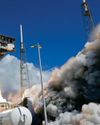
Long-awaited Starliner launch breaks a six-decade drought
An Atlas rocket has launched with astronauts aboard for the first time since Gordon Cooper's final Mercury flight in his Faith 7 capsule on 15 May 1963, powered by an Atlas LV-3B 130-D. The Atlas V rocket that launched on 5 June, manufactured by United Launch Alliance and powered at liftoff by a Russian-built RD-180 first-stage engine, carried Boeing's Starliner crew ferry ship to orbit following multiple launch delays over the past several days.

Non-CO2 emissions measured in commercial aircraft 100% SAF test
Results from the world's first in-flight study of the impact of using 100% sustainable aviation fuel (SAF) on both engines of a commercial aircraft show a reduction in soot particles and formation of contrail ice crystals compared to using conventional Jet A-1 fuel.
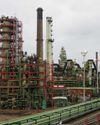
Avfuel, Neste sign SAF supply increase extension
Avfuel and renewable fuel producer Neste have finalised an extension to their agreement regarding the supply of sustainable aviation fuel (SAF) and set a framework for the deal through 2027.
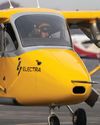
First flight for Electra hybrid 'blown lift' aircraft
Electra's blown-lift design uses eight electric motors to increase wing lift, allowing the eSTOL aircraft to take-off and land in just one-tenth of the space needed by conventional aircraft.
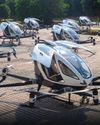
Saudi Arabia's groundbreaking air taxi trial set to transform Hajj travel for pilgrims
In a historic move, Saudi Arabia has successfully conducted its first air taxi trial in Mecca, setting the stage for deployment in the coming years and transforming Hajj transportation for pilgrims.
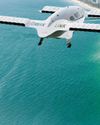
Lilium, French Government in 'advanced' talks for eVTOL jet manufacturing hub
The German manufacturer says it is in ‘advanced discussions’ with the French government to add a high-volume aircraft production facility in France, citing it as an attractive market for its flagship Lilium Jet. The company plans for the aircraft to enter service in 2026.
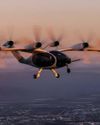
Joby partners with Mukamalah Aviation
Last month Joby Aviation announced it has signed a Memorandum of Understanding (MoU) with Mukamalah, a wholly owned subsidiary of Saudi Aramco, the operator of the world's largest fleet of corporate aircraft, to introduce Joby's aircraft to the Kingdom of Saudi Arabia.
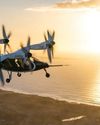
Joby acquires autonomous flight developer Xwing
Joby Aviation is one of many electric vertical take-off and landinng (eVTOL) air tax manufacturers that predicts autonomy will be the driver of ubiquitity for advanced air mobility (AAM) services and the company is placing its money where its mouth is.